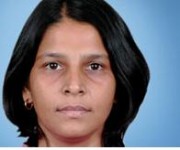Such deprivation is ugly

This is a song I heard in Sangrur,
" Mother speak to me from your grave
Tell me your joys and sorrows
Mother, tell me if I come to meet you
What form should I take
Mother, tell me, if you are not home
Why should I return…’’
The lyrics end and the girl who sings says, " I don’t remember the face my mother, never seen her…."
Abandoned by her mother after her farmer - father who took his own life, the 10 year old girl looks after her two younger brothers, ageing grandmother…she does it cheerfully, not see her work as a burden…the encounter with that girl is one of those moments when journalism underlines your helplessness, your own poverty……
Yes, helplessness is a very familiar feeling. In the past two and half years of television journalism, I have travelled to some of the poorest places and communities in the country…I have a compelling need to report on such issues. I have always asked myself why am I drawn to stories of struggle and injustice? I have had my share of struggle but not the direct experience of excruciating poverty that I report on. Yes, there is a reason of birth and blood. I come from Bolangir and may have indirectly experienced it despite being brought up by protective parents. But still, whenever I go out on assignments, I always I come back feeling inadequate, very defeated. Sometimes people say that it was a good story…but deep in my heart I am acutely aware of everything that I have not been able to say…of the fact that no matter how well-done a story is, the reality that even I as an outsider-reporter feel under my skin is beyond the power of my words or images. There are no sublime moments in these tragedies…people, their dreams and livelihoods perish not because of some personal hubris… I am not allowed to say it, but I would call it a crime that the present order perpetuates on its own people…it is ugly like Nithari killings… when close to 800 million people don’t have food, water, work how can it be normal? The humiliation that spreads like a fire in your face while begging for work or the shame of being unable to provide, how can that be normal? The routine way people break down in front of the camera, a reporter- stranger that is me, how can that be normal?
As a matter of duty, I do everything that I should not… I open up old wounds, I ask painful questions, I transgress boundaries, I enter the inner lives of people…I feel I am the beggar and they who tell me their stories are the kings…and yes beggars can also betray, I betray…the system betrays. Why do the lives of so many people continue to be so fragile? Why, despite laws and elections things don’t change fast enough? Why don’t our stories have enduring impact?
I believe, journalism is the most significant human achievement …not man’s landing on the moon, or the splitting of the atom, or the Vietnam War, or communism, … it is the very simple idea of news. I believe just as it is the nature of water to wet, of fire to burn, it is the nature of journalism to effect change… and just as the water that nourishes can also kill, fire that sustains can also destroy, journalism can effect change for better or for worse. I believe, it has no limitations except the ones it imposes on itself. I believe, if it is true to its nature, it is radical, it cannot be otherwise.
Often I get to hear that news channels have 0.1% time for poverty, development issues and the like. That would be 1.44 minutes per day out of 1440 minutes. And while there has been a spectacular expansion in the number of channels, newspapers, magazines, the space for some kinds of stories is shrinking… some people, concerns and ideas are simply vanishing from the news universe. Yes, you can make lots of money but you can only ignore the poor at the risk of making journalism itself irrelevant.
I feel lucky to be working with a very young channel CNN-IBN. I have to thank our editor in chief Rajdeep Sardesai…. I know sir, I am too old to be hand held… but you have done exactly that for more than two years now…thank you for the freedom and the restraint… for the encouragement and the anger, for Monday morning story ideas and forgiveness when I cross the line. I have to thank Diptosh Majumdar, for bearing the burnt of my daily disillusionments, Sagarika Ghosh, for making me move on from the world of documentary filmmaking telling, Sudeep Muhkia for going out of his way to help me with my scripts, Radha, Vinay and Deepika for always being there… all my colleagues in the national bureau, and the young ones…camera people, editors and producers who never come on screen… all those journalists and filmmakers who have created the path for me to tread on… God and Guru, mother and father, brothers and sisters, and friends I am not going to thank… I am nothing without them… the point I am trying to make is this award it is not just for me, it cannot be just me.